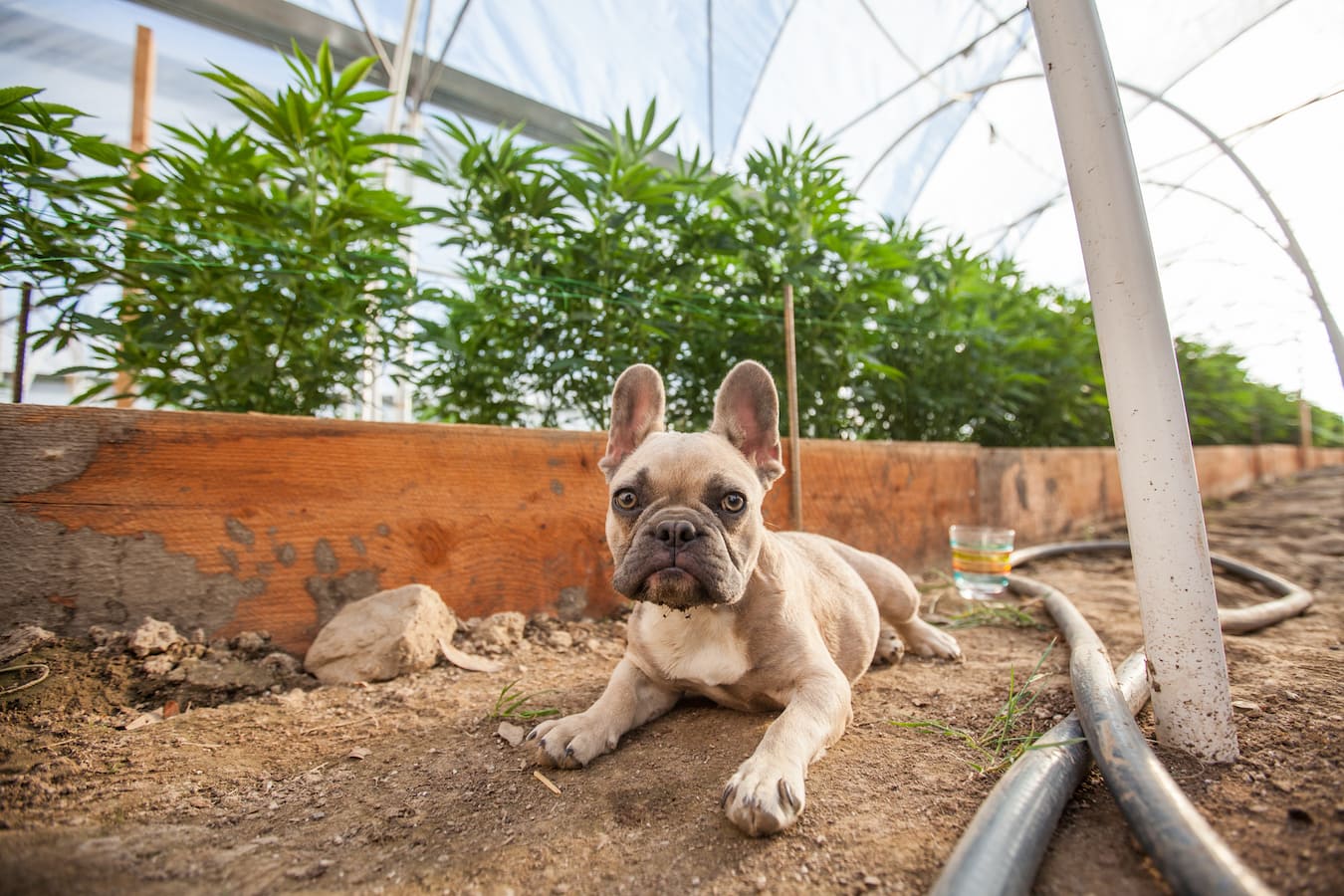CBD For Pets: A Complete Guide

CBD pet products are everywhere. It wasn’t long after CBD health benefits took the human wellness community by storm that it made its way into the holistic wellness arena for our four-legged companions. Many people who enjoy the benefits of high-quality CBD would love for their pets to be able to have the same experience, and in many cases, they can.
Although CBD works similarly in animals and humans, there are a few key differences regarding product quality, potency, and dosage that you’ll want to consider before you begin sharing CBD supplements to your pets.
Here’s what you need to understand about CBD and the animal body.
Is CBD Toxic to Animals?
There are plenty of things that are perfectly safe for humans but toxic to animals. People can safely enjoy grapes and chocolate, but these foods could potentially kill a dog.
Thus, many pet owners are understandably worried about the safety of the foods and supplements they give their pets.
CBD has never been demonstrated as toxic to animals. There has never been a fatal overdose of CBD in animals or humans alike.
Animals that ingest too much CBD may have drowsiness, lethargy, and some nausea, as very high amounts of CBD may have an effect similar to sedatives. Some animals may vomit or have diarrhea, but this isn’t a direct result of the pet CBD oil — it’s a consequence of ingesting too much oil, i.e. the carrier oil. This will happen to pets that consume any kind of oil in excess, and pets who eat greasy human food.
While CBD isn’t toxic to animals, THC has the potential to be toxic to animals. Always use CBD products derived from hemp, rather than from “normal” cannabis plants, to minimize the risk of exposing your pet to THC.
Always give your pet the appropriate amounts of CBD using the dropper as directed to avoid potential side effects related to overconsumption.
Is CBD Safe for Dogs and Cats?
CBD is generally recognized as safe for adult cats and dogs.
Kittens and puppies are still developing, and research hasn’t yet reached definitive conclusions on the impact of using CBD on a developing brain or body. Wait until your pets are fully grown before administering CBD.
You should also avoid giving CBD products to pregnant or nursing animals, as there are still many unknowns regarding the effects of fetal animal exposure to CBD and the transmission of CBD through an animal’s milk.
Does CBD Get Pets High?
In short, no. CBD won’t get your pets high, as long as you’re giving them hemp-derived CBD products without any added THC.
CBD, or cannabidiol, is a non-psychoactive cannabinoid from the cannabis plant that works with your pet’s brain and body to support holistic wellness.
THC, or tetrahydrocannabinol, is a completely different cannabinoid. When people refer to getting high as a result of using cannabis products, they’re referring to the effects of THC compounds.
The majority of CBD products are made from a special classification of cannabis plants called hemp plants. Hemp plants are cannabis plants in every way except one — they don’t produce a meaningful amount of THC.
By definition, a cannabis plant is considered a “hemp plant” if it produces 0.3% or less THC by its dry weight. This concentration of THC is not significant enough to produce mind-altering effects.
Does CBD Really Help Pets?
A plethora of research indicates that CBD has the potential to be just as useful for pets as it is for humans.
CBD is what is referred to as a nutraceutical. It isn’t a necessary vitamin or mineral, but it works to support the overall wellbeing of the body.
Since human bodies and animal bodies contain the same organs and generally require the same types of nutrition and support, and there’s good evidence to show that your pet can enjoy CBD just as much as you do.
What Does CBD Do for an Animal?
CBD works with the body’s endocannabinoid system to provide support. The endocannabinoid system is a series of cannabinoid receptors that exist throughout the brain and body. These receptors have a relationship with and influence on many homeostatic processes (i.e. processes that keep our bodies in balance) like supporting mood, inflammatory response, the immune system, and the sleep process.
CBD works with these receptors to support the body’s efforts in maintaining an ideal natural balance of these systems. It inspires positive change by providing holistic support to many necessary functions.
Animals often benefit from CBD supplementation for overall joint mobility and easing emotional and physical tension. CBD can also work to support normal brain health and normal gastrointestinal health.
Can All Pets Have CBD?
Every single animal has an endocannabinoid system. Clams, vultures, giraffes, pangolins, swordfish, olingos, sea urchins, and elephants will all respond to cannabinoids.
There is no evidence to suggest that CBD would be harmful to any animal, but there’s also a limited amount of data regarding how to effectively and appropriately use CBD for many types of animals.
Cats, dogs, rabbits, guinea pigs, and horses are common household pets that have been successfully using weight-appropriate doses of CBD for extended periods of time.
Some friendly farmers use CBD for companion cows, chickens, and sheep. Experimental CBD-infused feeds are being studied among livestock animals, but research has not yet produced definitive conclusions. If you have pet chickens, it’s best to wait for conclusive data before feeding them CBD-infused foods.
Don’t use CBD for fish, reptiles, and amphibians. There isn’t an effective delivery method of CBD for fish, and there is no data regarding effective doses or use cases of CBD for pets like lizards, snakes, frogs, iguanas, and turtles. Yet.
What Kind of CBD Can I Give My Pets?
Pets can have many of the same kinds of hemp-derived CBD products that humans can have. CBD comes in different varieties, each omitting groups of cannabinoids and aromatic compounds called terpenes until the final product reaches pure CBD.
CBD dog treats, soft chews, CBD oil tinctures, pet-specific full-spectrum CBD oil, and more are available for purchase, and knowing what is best for your pet allows you to make the right choice.
Full-Spectrum CBD
Full-spectrum CBD is the most popular variety of CBD among the wellness community. Full-spectrum CBD is pure extract from the hemp plant, which includes all of the plant’s other cannabinoids, terpenes, fatty acids, and other plant nutrients.
Full-spectrum hemp extract products contain a very small amount of THC, but it isn’t enough to produce psychoactive effects. Think of it like alcohol in vanilla extract. Although the extract contains alcohol, you won’t get drunk if you eat a few cupcakes. Or even a lot of cupcakes. (We’ve all been there.)
Research suggests that full-spectrum CBD products are the most effective because cannabinoids and terpenes work in synergy to produce their effects. By leaving the hemp extract fully intact, it’s able to work as nature intended.
Broad-Spectrum CBD
Some pet owners may have reservations about giving any amount of THC to their pets. While this limits options, it doesn’t take CBD out of the equation.
Broad-spectrum CBD is a hemp extract that leaves every cannabinoid and terpene intact, aside from THC. The THC is separated and removed from the hemp extract, leaving virtually no trace amount behind.
People who aren’t comfortable with consuming any amount of THC or giving it to their pets may feel that broad-spectrum CBD is a suitable compromise. You’re getting most of the beneficial compounds from the plant, aside from the one compound you’d prefer to avoid.
CBD Isolate
CBD isolate is only cannabidiol. It doesn’t contain any other cannabinoids or terpenes that naturally occur in the hemp plant. This can be a double-edged sword. While isolate products sacrifice the synergistic effect of other plant compounds and eliminate the potential benefits from other cannabinoids, they will provide the cannabinoid benefits exclusive to CBD.
CBD used independently from all other cannabinoids has been demonstrated to promote a calm mood and support better sleep. If those are your only wellness concerns for your pet, then CBD isolate products will suit your pet’s needs.
Can You Give Pets Human CBD?
Pets (with the exception of horses and dog breeds like mastiffs) generally weigh much less than humans, and will therefore need less CBD. Pet-specific CBD is made without any additives and is diluted to a strength easier to serve to smaller animals. That doesn’t mean that pets can’t have CBD products intended for humans. It just means it’s a little more work to find a suitable CBD product and dose it out appropriately.
Pets can have low-strength human CBD products without any flavoring additives, that have been prepared with a neutral carrier oil like hemp seed oil or extra virgin olive oil. Always check the third-party lab report on a batch of CBD to assure the product is pure, safe, and free from contaminants.
You should also avoid giving your pet cannabis-derived CBD products. Hemp-derived CBD products contain very minimal amounts of THC, which will not be enough to cause a psychoactive reaction in your pets, even at high doses.
Human CBD products with higher levels of THC may be harmful to your pets and should not be administered.
How Much CBD Can My Pet Have?
Pets don’t need a lot of CBD. Most experts recommend using 1 to 2 milligrams of CBD per ten pounds of your dog’s body weight, meaning that a 30-pound dog should have 3 to 6 milligrams per serving.
Cats have fewer cannabinoid receptors and may experience better results using 2 to 4 milligrams of CBD per ten pounds of body weight.
Horses often weigh up to 1,000 pounds, and equine CBD isn’t usually administered the same way. They’ll likely need more CBD than other animals. A horse can safely have up to 250 milligrams of CBD per day, although many horse experts find that a lower dose of 50 milligrams daily is enough to keep horses calm and relaxed.
The best thing to do is start your pet on the lowest possible dose, use it daily, and wait several weeks to observe potential changes. If the benefits aren’t significant, add another milligram per ten pounds and try again, waiting for a few weeks.
It’s virtually impossible to overdose on CBD, but pet owners should still be patient and discerning when giving CBD supplements to their animals.
How Long Does It Take Pet CBD to Kick In?
Once administered, CBD’s effects will become apparent within 45 minutes to 2 hours depending on the dose administered, the weight of your animal, and the contents of your pet’s digestive tract. The short-term effects of CBD will last 8 to 12 hours.
For consistent, predictable, meaningful benefits, your pet will need to use CBD regularly. Giving your pet CBD every 12 hours will provide a continuous stream of calming relief.
It may take up to a month to notice calming effects in your pet’s behavior. If it seems like CBD isn’t working, it’s better to remain consistent and keep providing it for your pet, as long as your pet is tolerating it well.
Why Do Vets Not Recommend CBD?
The law does not currently allow practicing veterinarians to prescribe or even recommend any cannabis products for animals. This may raise a red flag for discerning pet owners. If it’s safe and effective, why can’t vets tell pet owners about the benefits of CBD?
There is no hidden conspiracy at play. It’s merely the fact that laws and research take a long time to meet each other. CBD use for humans was only recently popularized and made fully legal in most states. Recreational cannabis is slowly gaining traction. It’s simply a matter of red tape and liability.
Veterinarians aren’t legally allowed to recommend CBD in most states. Nevada became the first state to protect veterinarians from repercussions for prescribing CBD, and their law didn’t go into effect until October 2021. It’s likely other states will follow at their own pace.
Although veterinarians are forbidden from outright recommending cannabis (including hemp) derived products, there are plenty of cannabis brands established by veterinarians that use veterinarian-approved formulas for their products.
Vets who don’t currently treat pet patients have the freedom to be more vocal about their support of cannabinoids in pet wellness, as they don’t have to be concerned about negative repercussions that would impact their ability to work in their industry.
Despite how many pet owners feel about the idea of animal testing, it’s worth noting that the overwhelming majority of CBD safety studies were conducted on animals. Animals cannot fatally overdose on CBD, and the overwhelming majority of studies indicate that CBD is safe for long-term use when administered in weight-appropriate doses.
There are some very important questions you should ask your veterinarian if your pet is currently taking any medications or supplements. Your vet may not be able to recommend CBD, but they can inform you of any potential risks or conflicts you should be aware of in the event you decide to give your pet CBD.
CBD can affect the way your pet’s body processes and uses the medications they need. Even if your vet decides to remain tight-lipped on CBD recommendations (which is understandable given the circumstances), ask your vet if CBD might interfere with your animal’s medications. If it will, don’t give your pet CBD.
CBD Is Not a Replacement for Veterinary Care or Prescription Medication
If you’re noticing persistent distressed behavior or chronic joint pain negatively impacting your pet’s quality of life, don’t go straight for CBD supplements. You need to book an appointment with a veterinarian and have your pet thoroughly examined as soon as possible. There may be underlying issues that can only be properly addressed with specific and effective treatments. Rule these things out first.
CBD is best reserved for pets who only occasionally experience environmental distress, like fear of thunderstorms or fireworks. It may be a valuable solution for senior pets who need a little extra joint support as they age. Don’t use CBD unless your pet is otherwise healthy.
There is at least one context where CBD could serve as medication for your pet. CBD was approved by the FDA to treat rare seizure disorders after clinical trials demonstrated that cannabidiol was highly effective at reducing the frequency of seizures in patients. CBD is not generally taken alone, but in conjunction with other seizure drugs to create a comprehensive seizure management plan.
If your dog has seizures and is currently taking seizure management medication, it’s worth asking your vet about CBD as a complementary treatment. Although your vet can’t prescribe CBD to your pet, your vet will be able to share their personal thoughts about CBD use for seizures in pets, and give you the information you need to make your own well-informed decision.
Using evo hemp CBD for Your Pets
Our full strength CBD oil contains 25 mg CBD per serving, making it easy to dispense to your pets. Try putting just a couple drops on your pet’s favorite treat twice a day for a few weeks to see how CBD benefits your pet’s wellness.
Sources:
CBD vs THC: A Guide to the Differences | CNBS
The Endocannabinoid System, Our Universal Regulator | Journal of Young Investigators
Nevada takes lead on CBD in veterinary medicine | VIN
CBD for dogs with arthritis: What does the science actually say? | CARE



